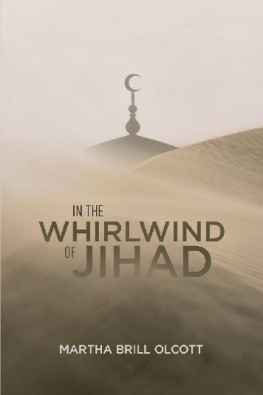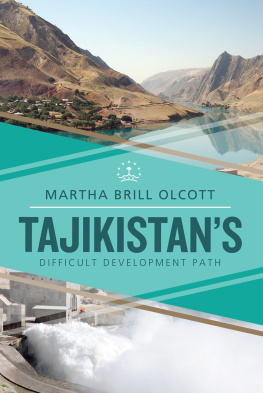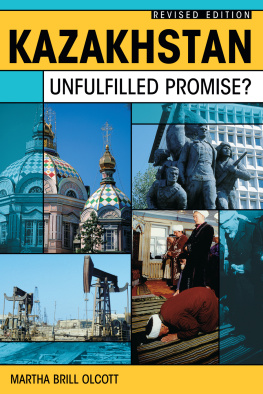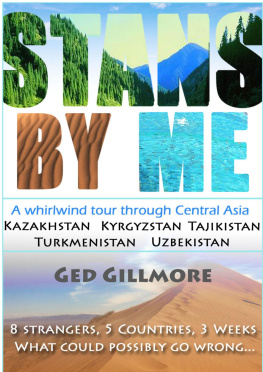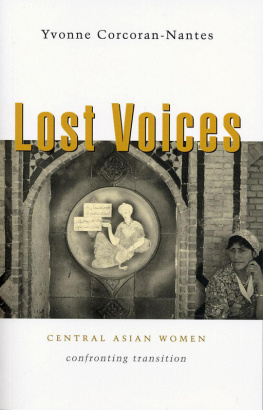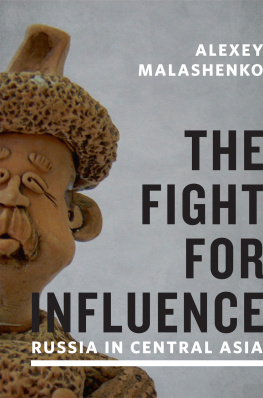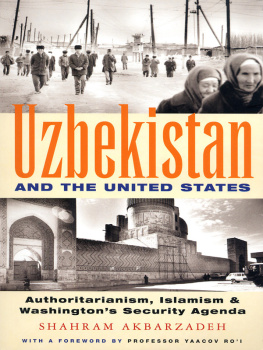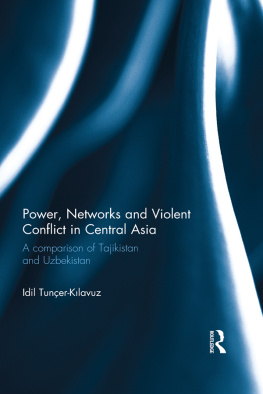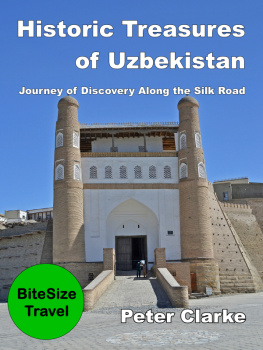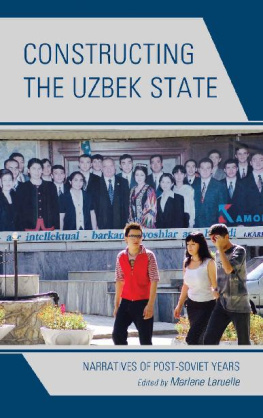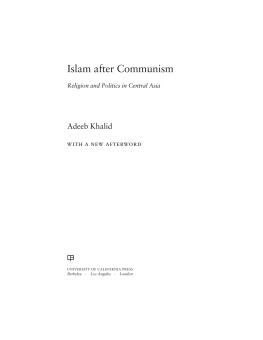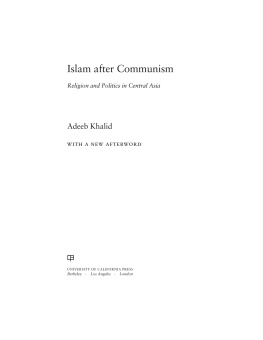2012 Carnegie Endowment for International Peace. All rights reserved.
No part of this publication may be reproduced or transmitted in any form or by any means without written permission from the Carnegie Endowment.
Carnegie Endowment for International Peace
1779 Massachusetts Avenue, N.W., Washington, D.C. 20036
202-483-7600, Fax 202-483-1840
www.ceip.org
The Carnegie Endowment does not take institutional positions on public policy issues; the views represented here are the authors own and do not necessarily reflect the views of the Endowment, its staff, or its trustees.
To order, contact:
Hopkins Fulfillment Service
P.O. Box 50370, Baltimore, MD 21211-4370
1-800-537-5487 or 1-410-516-6956
Fax 1-410-516-6998
Library of Congress Cataloging-in-Publication Data
Olcott, Martha Brill, 1949
In the whirlwind of jihad / Martha Brill Olcott.
pages; cm
Includes bibliographical references and index.
ISBN 978-0-87003-259-2 (paperback) ISBN 978-0-87003-260-8 (cloth)
1. Islam and stateUzbekistanHistory20th century.
2. Islam and stateUzbekistanHistory21st century.
3. IslamUzbekistanHistory20th century.
4. IslamUzbekistanHistory21st century.
5. Islamic renewalUzbekistan.
6. Islam and stateSoviet Union.
7. IslamAsia, CentralHistory20th century.
8. IslamAsia, CentralHistory21st century.
I. Title.
BP63.U9O43 2011
297.09587 dc23
2011047617
Cover design by Jocelyn Soly
Composition by Zeena Feldman
TABLE OF CONTENTS
FOREWORD
From the time of the Arab Conquest in the seventh century, Islam has been an ever-present factor in the lives of the peoples who have lived in modern-day Uzbekistanand a force that political leaders must contend with to secure their authority.
A center of learning in philosophy, science, and the arts during the centuries of the Islamic Empire, for most of modern history, Central Asias population has accepted a fusion of religious authority with political power. Since the Russian Conquest, however, Islam has been subordinated to the will of secular authorities. Throughout Soviet rule, the relationship was a contentious one, but one that most believers felt powerless to alter. As the Kremlins power waned, the region experienced a strong religious revival. This revival was far-reaching enough to convince the government of newly independent Uzbekistan, particularly Islam Karimov, Uzbekistans first and, to date, only president, that bringing Islam back under state control had to be done in a way that did not antagonize the majority of believers.
In her comprehensive volume, In the Whirlwind of Jihad , Carnegie Endowment Senior Associate Martha Brill Olcott examines the evolving role of Islam in Uzbekistan and the intertwined nature of religion, the state, and society in the country. She details the religious revival in Uzbekistan over twenty years of independenceintroducing readers to the varied cast of clerics and officials as well as to the competing interpretations of Islam, including the regions traditional Hanafi school of Sunni Islam, Salafi (fundamentalist) critics, and the teachings of Sufi masters who originally came from this land. She also examines the potential for conflict and the very real confrontations that have occurred since independence, such as the rise of the Islamic Movement of Uzbekistan that is now part of the al-Qaeda network, and the tragic confrontation between citizens and Uzbek authorities in Andijan in 2005. Her analysis draws on the implications of these events for the peaceful coexistence of Islam and the Uzbek state.
Uzbekistans government continues to negotiate the balance between the religious and the seculara challenge made more difficult in a globalized, post-9/11 world in which communication and exposure to external forces can be very broadening but are fraught with risks of conflict, and even terrorism. The latter is no empty threat for Uzbekistan, which shares a border with Afghanistan. Finally, there is the question of what will happen after Karimovs inevitable departure and what role Islam will likely play in the period of transition and in the legitimation of his successor.
Uzbekistan is Central Asias most populous nation, thirty million strong, sharing borders with the other four former Soviet republics and with Afghanistan. Its choices in the next phase in its national history will affect the security of all of its neighbors, increasing tensions and risks in an already troubled region. Understanding developments in this country is more critical than ever, and Olcotts book shines a needed light on this intriguing and timely topic.
JESSICA T. MATHEWS
President
Carnegie Endowment for International Peace
PREFACE
The title of this book, In the Whirlwind of Jihad , comes from the struggle that the Quran enjoins believers to engage in if they are to live lives that are in accordance with the will of Allah. While most of the social science literature about jihad focuses on jihad bil saif when believers engage in an armed struggle in defense of Islamthe Quran terms this a lesser jihad, as it is the product of the circumstances in which a believer finds himself. But every Muslim believer must engage in jihad al-nafs , the greater jihad, as it is a struggle to rid evil from within oneself.
This book looks at the intertwined nature of religion, the state, and society in Uzbekistan and the evolving relationships among them. It focuses on the impact of Islams legacy on the nature of the religious revival that occurred from the late 1980s through 2001 and the policy implications of this revival, both for the Uzbek state and for the international community more generally. These years encompass the period from the collapse of the Soviet Union to the launching of the U.S.-led war on terror in neighboring Afghanistan.
From the time of the Arab Conquest in the seventh century to the present day, Islam has been an ever-present factor in the lives of the people who live in the territory that is now Uzbekistan and a force that political leaders have had to contend with as they sought to assert their authority. For this reason, jihad, in at least one of its two forms, has always been a feature of life in Uzbekistan.
This book looks at some of the battles over ideas in Islamic thinking in Central Asia and shows a trajectory of development that crosses national boundaries within the region, including the ways in which the areas Islamic community responds to global Islamic influences.
It describes the evolving role of religion in Uzbekistan, concentrating on the legacy of the late colonial and especially Soviet periods, in helping to shape the way that Islam has developed since independence. It is likely to continue to evolve over the next decade or so as Uzbekistan completes the transition from Soviet rule by bringing to power a leadership that has been raised under the conditions of independence.
Much of the literature on religion in Uzbekistan, and on Central Asia before it, has created the impression that this region was somehow removed from the rest of the Muslim world. While this book does not attempt to be a comprehensive history of Islam in Central Asia, or Islam in Uzbekistan, it seeks to contribute to the growing literature written in Western languages, Russian, Uzbek, and Tajik, which tries to give a strong sense of the religious continuity that has existed in Central Asia. The book describes the restrictions that were placed on religious believers during the Soviet period and the ways in which both the practice of religious rituals and the teachings of the faith were preserved.

